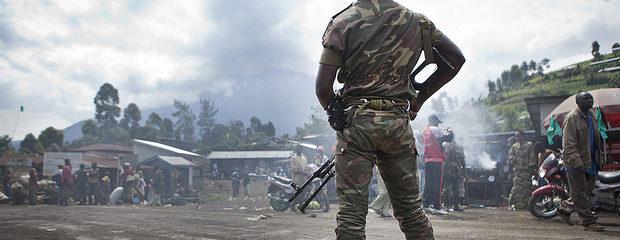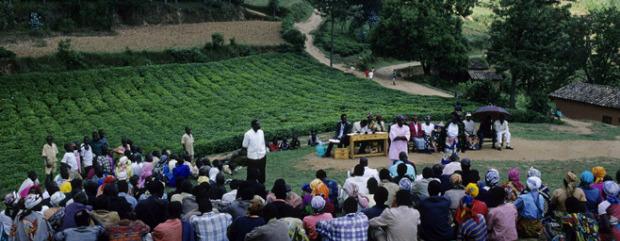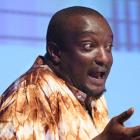DR Congo in crisis: Can Kabila trust his own army?

Despite protests intensifying with outbreaks of violence and deaths, President Joseph Kabila has yet to call on his armed forces to maintain order. He might regret it if he did.

In yesterday’s protests, 17 people were killed according to the government. Credit: MONUSCO/Sylvain Liechti.
The Democratic Republic of the Congo (DRC) is in the midst of a protracted political crisis as President Joseph Kabila manoeuvres to stay in power past the end of his second term, which expires this December.
Kabila’s undemocratic machinations – most notably le glissement (‘slippage’) or delaying of elections due to “logistical” issues – have drawn the ire of much of the population with frequent protests and strikes rocking the country since early 2015.
[DR Congo: Can anyone stop Joseph Kabila?]
Yesterday, these reached a new pitch as protesters took to the streets, angry at Kabila’s recent efforts to promote a “national dialogue” – a move the opposition sees as a cynical ploy to legitimise le glissement. In Kinshasa and Goma, violence erupted as heavily armed police confronted protesters, leading to the deaths of at least 17 according to the government and more than 50 according to the opposition. Four people also reportedly died when the headquarters of three different opposition parties were burnt down in the night.
17 people have died during protests in #Kinshasa #RDC https://t.co/rLUsGWXNf5 pic.twitter.com/1292KG0tCp
— Ruptly (@Ruptly) September 20, 2016
At least 17 people have been killed during anti-government protests in the #DRC capital, Kinshasa https://t.co/SzSJO7WmnX pic.twitter.com/Zf24jbm0Sg
— Al Jazeera English (@AJEnglish) September 20, 2016
UDPS Headquarters burned down last night. @fatshi13 says as many as 5 dead, blamed attack on sec forces pic.twitter.com/WGblnoBCqf
— Tom Wilson (@thomas_m_wilson) September 20, 2016
With further protests sure to follow and the possibility of continued violence looming large, it is worth asking why Kabila has yet to deploy the military. The answer lies in a deep history of mistrust.
Preferred instruments of intimidation
The DRC is among the most heavily militarised states in Africa, with its 70,000-strong Congolese armed forces (FARDC) deployed within the country to combat various low-intensity threats. However, thus far it has not been the army that Kabila has called upon on to “restore public order” but the national police (PNC), the civilian intelligence service (ANR), and, most notably, the Republican Guard – Kabila’s personal security outfit.
According to an October 2015 report by the UN’s Joint Human Rights Office, there were 142 human rights violations against members of the political opposition that year. Tellingly, 69 of these were carried out by the PNC, 24 by the ANR, and just 9 by FARDC. The actual number of FARDC violations is lower, however, as the report fails to note that the Republican Guard operates outside the army’s chain of command.
Since he came to office in 2001, Kabila has steadily built up civilian security forces, over which he exercises direct control, at the expense of FARDC, the loyalty and effectiveness of which are in doubt.
He has built the PNC into a veritable paramilitary force, most notably in the capital city and opposition stronghold of Kinshasa where the police chief, Kabila’s longtime ally Celestin Kanyama, has earned the moniker espirit de mort (‘spirit of death’). He has managed to effectively purchase the ANR’s loyalty, which has its roots in the intelligence agencies of Mobutu Sese Seko’s rule (1965-97).
And, most crucially to the survival of his regime, Kabila has buttressed his presidency with a disproportionately formidable Republican Guard. Nominally a simple presidential security outfit, the Republican Guard enjoys full-division strength and receives superior weapons and training than FARDC. The unit’s top officers hail from the president’s home state of Katanga, an obvious ploy to ensure the unit’s loyalty.
The existence of a disproportionately sized and financed presidential guard is generally considered to be indicative of a weak security sector and poor governance, and Kabila’s Republican Guard is no exception.
FARDC’s patronage politics
The Congolese military took its current name and structure in 2002 in the midst of the Second Congo War. As part of the Sun City Agreement, which sought to end the conflict through a power-sharing arrangement, the largest rebel groups were incorporated into the armed forces, including the Rwandan-backed RCD-Goma, the Ugandan-backed RCD-Kinsangani and MLC groups, and various Mayi-Mayi ethno-nationalist militias. In 2009 the CNDP, a formidable rebel group formed to defend Congolese Tutsis, joined FARDC’s ranks as well.
FARDC thus acts as an instrument of political patronage to co-opt rivals more than as a fighting force to provide security. By one estimate, 65% of the FARDC are officers, 26% of whom are high-ranking, creating an absurdly top-heavy organisation that begets unnecessary bureaucracy and promotes impunity.
Combined with poor training, low pay, a critical lack of espirit de corps, and a culture of corruption and politicisation that dates back to independence – the Congolese military has attempted nine coups since 1960 – the result is one of the least professional armies in Africa.
Furthermore, despite pledging loyalty to the president, former rebels brought into FARDC have frequently maintained separate chains of command. The danger of this arrangement came to a head in April 2012, when former CNDP rebels defected en masse and took up arms against the government, calling themselves the M23 movement.
With the help of the Force Intervention Brigade – the first UN peacekeeping force in history with a strong offensive mandate – FARDC eventually defeated the rebels in October 2013, but the counterinsurgency highlighted strong turf wars within FARDC which frequently hampered operational effectiveness.
Speculation remains that one of the FARDC’s most competent officers, Col. Mamadou Ndala, was assassinated by rival commanders during the counterinsurgency, highlighting the mistrust that permeates FARDC’s ranks.
Wary of another rebellion, Kabila ordered a significant reshuffle of FARDC in October 2014. The reshuffle is unlikely, however, to have significantly tightened the president’s grip on the fractious military. Many of those who benefited from the reshuffle were former rebel commanders who had remained loyal to FARDC during the M23 rebellion. But these commanders sided with government not because they felt any strong allegiance to Kabila, but rather because the M23’s grievances were very specific to former CNDP combatants.
In the reshuffle, some of Kabila’s fellow Katangans also secured top commands. Such moves exacerbate the debilitating patronage which lies at the core of FARDC’s institutional weakness. Members of the Republican Guard reportedly even threatened to stage a coup out of disapproval of their new commander, forcing the president to hastily reassign the general in question.
Who can restore order?
This week’s events suggest that Kabila will not be able to maintain the status quo through half-hearted “dialogue”. This being the case, we can expect the opposition to seek to resolve matters on the streets through protests of a more frequent, widespread, and violent nature than the country has heretofore experienced.
[DR Congo’s electoral process is at an impasse. Here are 3 scenarios for what comes next]
Regardless of whether Kabila can fully trust the Republican Guard (and history from Caligula to Kabila’s late father teaches us not to depend too heavily on bodyguards), the force would be too small to confront a nationwide crisis, even with support from the police and ANR. Indeed, reports indicate that in the latest round of clashes, protestors managed to overwhelm police barricades, killing two officers.
Kabila may thus be left with little choice but to call on the armed forces. Such a deployment is liable to make matters worse for everyone. Given the abysmal record of human rights abuses by FARDC in the eastern Congo, such a deployment would almost inevitably lead to wanton bloodshed. Given the fractious state of the Congolese military, it could also backfire on Kabila’s regime itself.
James Barnett is currently a Boren Scholar in Tanzania, having previously researched at the Africa Center for Strategic Studies at the National Defense University in Washington, D.C. You can follow him on Twitter @jbar1648. All views expressed are his own.






Violence breeds more violence. The Leadership Cadre in DRCongo lack discipline which when coupled with implementing kinetic action will create further roiling.
Will DRCongo become the next Syria? I most fervently hope not.
The West must impose the message strong upon the DRCongo Leadership Cadre that any form of civic citizen violence imposed by the ‘de jure’ DRCongo Government will ensure Criminal Prosecution under ICC aegis.
DRCongo must not become the next Syria where in Syria the various warring factions, non of which have essential legitimacy are making life for the people a living hell.
I do not understand the analysis of this article. Is it saying that Kabila is reluctant to use his army against protesters because he doesn’t trust it? If that is the thesis, it is very weak indeed. President’s in DRC have always used the army in this way, regardless of whether or not they trust it. the two issues are not linked in any simple way. Mobutu’s reaction to his support draining away in the army was to put it on the street and let it pillage! and in any case Kabila has used the army against street protesters in the past and will again.
I would also like to know the source of this assertion:
“He has managed to effectively purchase the ANR’s loyalty”. I find it surprising and the link is not a reference to a source
Understand most clear, “if you don’t fix the adminstration of this country—-go after the bribe gobblers and the tyrants—-you can send all the soldiers you want, security will never come”.
These words were uttered by a Village Elder in Afghanistan in 2009.
Appreciate that Corruption facilitates state fragility including civic civil social discord.
I am surprised with United Nations organization opinion in DR Congo. And why those opinion do not apply to neighboring countries like Rwanda, Uganda and many more countries around Congo.
Congolese government has delayed election for good reason. but small group of people has find the way around to communicate with US official to create problems in Kinshasa
When shall all this killings come to an end…God Help Us!